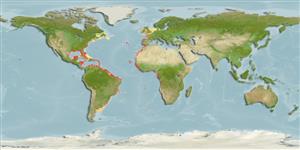Environment: milieu / climate zone / depth range / distribution range
生態学
海; 新鮮な水; 汽水性の 関連する礁; 両側回遊性 (Ref. 51243); 深さの範囲 0 - 40 m (Ref. 3789), usually 0 - 15 m (Ref. 42064). Subtropical; 10°C - 40°C (Ref. 93687); 49°N - 44°S, 99°W - 14°E (Ref. 55254)
Atlantic Ocean: from Nova Scotia, Bermuda and southward to Brazil in western Atlantic Ocean (Ref. 3234, 4446), where it it also found throughout the Gulf of Mexico and the Caribbean (Ref. 26938); from Mauritania to Angola in eastern Atlantic Ocean (Ref. 2845, 3234, 4446, 81266); with exceptional records in Portugal, Azores and Atlantic coast of southern France (Ref. 3234, 4446). Crossed the Panama canal and was caught at Coiba Island in the Pacific Ocean (Ref. 4446).
Length at first maturity / サイズ / 重さ / 年齢
Maturity: Lm 160.0, range 130 - 128.5 cm
Max length : 250 cm TL オス/雌雄の選別がない; (Ref. 2683); common length : 130 cm TL オス/雌雄の選別がない; (Ref. 2683); 最大公表体重: 161.0 kg (Ref. 26340); 最大記録サイズ: 55 年 (Ref. 9975)
背面の脊椎 (合計) : 0; 背鰭 (合計) : 13 - 16; 肛門の骨: 0; 臀鰭: 22 - 25; 脊つい: 53 - 57. Diagnosis: It is characterized by the anterior position of pelvic fin insertions in relation to dorsal-fin origin, and by some morphometric counts: 13-16 dorsal-fin rays, 40-48 lateral-line scales and 53-57 vertebrae (Ref. 2845, 81266).
Obligate air-breathing (Ref. 126274); Inhabit coastal waters, bays, estuaries, mangrove-lined lagoons, and rivers (Ref. 3789, 27188). Often found in river mouths and bays, entering fresh water (Ref. 27227). Lower depth limit at 40m (Ref. 118621). Large schools may frequent particular spots for years (Ref. 9710). Feed on fishes like sardines, anchovies, Mugilidae, Centropomus, Cichlidae (mainly those forming schools) and crabs (Ref. 3789, 27188). The swim bladder, attached to the esophagus, can be filled directly with air and permits the fish to live in oxygen-poor waters. Has high fecundity, a 203 cm female is estimated to produce over 12 million eggs (Ref. 10863). Spawn in waters which can be temporarily isolated from the open sea (Ref. 27188). Transparent leptocephalus larvae migrate into estuaries (Ref. 57533). Famous for its spectacular leaps when hooked. Marketed fresh or salted (Ref. 3789). Large scales are used in ornamental work and in preparation of artificial pearls (Ref. 3789). Used to be cultured commercially in Colombia (Ref. 7306). Highly appreciated by sport fishers. The flesh is also highly appreciated despite its being bony (Ref. 27188). The world record for hook and line is 283 lbs. from Lake Maricaibo, Venezuela (Ref. 13442).
Some populations may complete life cycle in freshwater, e.g. Lake Nicaragua in Central America, and Deep Lake in Florida (Ref. 4639).
Hureau, J.-C., 1984. Megalopidae. p. 226-227. In P.J.P. Whitehead, M.-L. Bauchot, J.-C. Hureau, J. Nielsen and E. Tortonese (eds.) Fishes of the north-eastern Atlantic and Mediterranean. UNESCO, Paris. Vol. 1. (Ref. 3234)
人間に対する脅威
Reports of ciguatera poisoning (Ref. 31172)
Human uses
水産業: 商業; 水産養殖: 商業; ゲームフィッシュ: はい; 水族館・水槽: 公共の水族館
用具
特記事項
XMLをダウンロードして下さい
インターネットの情報源
Estimates based on models
Preferred temperature (Ref.
123201): 19.6 - 28, mean 27 °C (based on 1409 cells).
Phylogenetic diversity index (Ref.
82804): PD
50 = 1.0020 [Uniqueness, from 0.5 = low to 2.0 = high].
Bayesian length-weight: a=0.01023 (0.00419 - 0.02501), b=3.02 (2.81 - 3.23), in cm total length, based on LWR estimates for this (Sub)family-body shape (Ref.
93245).
栄養段階 (Ref.
69278): 4.5 ±0.0 se; based on diet studies.
回復力 (Ref.
120179): 低い, 4.5年~14年の倍増期間の最小個体群 (K=0.07-0.10; tmax=55; Fec>1 million).
Prior r = 0.34, 95% CL = 0.22 - 0.51, Based on 1 data-limited stock assessment.
Fishing Vulnerability (Ref.
59153): Very high vulnerability (76 of 100).
Climate Vulnerability (Ref.
125649): High to very high vulnerability (67 of 100).
Nutrients (Ref.
124155): Calcium = 8.83 [4.70, 21.29] mg/100g; Iron = 0.421 [0.226, 0.795] mg/100g; Protein = 19.5 [16.7, 22.0] %; Omega3 = 0.21 [0.11, 0.40] g/100g; Selenium = 21.2 [9.5, 44.3] μg/100g; VitaminA = 33 [9, 118] μg/100g; Zinc = 0.458 [0.310, 0.701] mg/100g (wet weight);
